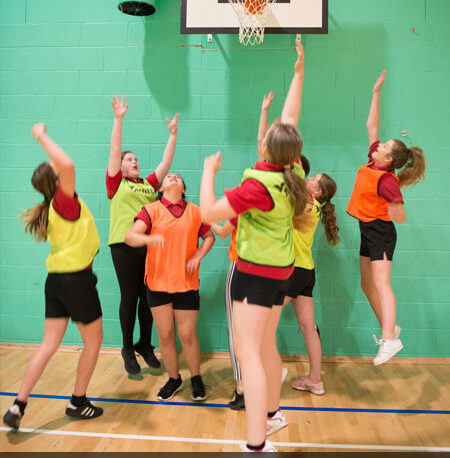Physical Education
Key Stage 3
In Key Stage 3 Physical Education, pupils focus on building a foundation of transferable skills and techniques that apply across various sports and activities. They learn key rules and essential principles of play, helping them to understand the structure and flow of different games. Pupils also explore individual and team tactics, enhancing their strategic thinking and ability to collaborate effectively. Alongside developing skills and knowledge, pupils work on improving their physical fitness, supporting overall health and well-being. This hands-on learning builds additional skills such as communication, leadership and problem-solving, all of which can be transferred to other aspects of life, preparing pupils for success both on and off the field. Our curriculum aims to holistically develop pupils and enable them to lead a lifelong, active and healthy lifestyle.
Pupils are assessed using our Head, Heart and Hands assessment policy:
- Head (Knowledge): This focuses on assessing pupils’ understanding and knowledge of each sport or activity.
- Heart (Attitude and Fitness): This assesses pupils’ attitude towards participation and their fitness level.
- Hands (Performance): This evaluates pupils’ practical performance and skills in activities.
We assess pupils using descriptors and key performance indicators that align closely with our curriculum’s structure and sequence. These descriptors incorporate elements from the national curriculum and, in certain areas, go beyond its requirements to support deeper learning and skill development. Each domain is scored out of 3 points, allowing a total of 9 points per sport or activity. The points are used to categorise pupil performance levels as follows:
- 0-4 Points: Working below expectations
- 5-6 Points: Working at expected level
- 7-9 Points: Working beyond expectations
The Physical Education Department aims to provide an enjoyable and balanced programme with opportunities for all pupils to develop physically, socially, emotionally and cognitively. The physical education curriculum offers a comprehensive range of experiences that demonstrate equity and inclusion. The department aims to develop pupils, not just as performers, but also their overall understanding of the activities, and encourage resilience and hard work. These are acknowledged when assessing the pupils through our ‘Head, Hands and Heart’ assessment model.
Key Stage 4
At Key Stage 4, an element of choice is introduced into the curriculum, allowing pupils to select a preferred pathway based on their interests and preferred activities. In years 10 and 11, core PE classes can be structured as mixed or single-gender groups, depending on the activity pathway chosen by each pupil. This approach aims to foster enjoyment and engagement, encouraging pupils to pursue lifelong involvement in sports and physical activity. By offering choice and flexibility, the curriculum supports pupils in finding a pathway that suits their needs, making physical activity more enjoyable and personally relevant.
Extra Curricular PE
The Physical Education Department is dedicated to providing pupils with ample opportunities to engage in physical activity through a vibrant extra-curricular program. A variety of sports and activities are offered daily during lunchtimes and after school, ensuring all year groups have access to programs suited to their interests and skill levels. Additionally, pupils have the chance to participate in local, county, and national fixtures throughout the year, allowing them to compete at higher levels and even represent their district in various sports. This comprehensive program encourages skill development, teamwork, and a lifelong love of physical activity.
Examination Options within PE:
OCR GCSE Physical Education
The GCSE PE (Physical Education) OCR course is a mix of practical and theoretical study, focusing on understanding the body in sport and enhancing performance skills. The course is divided into 60% examination and 40% practical assessment. The examination component, which consists of two written papers, assesses pupils’ knowledge of topics such as anatomy, physiology, movement analysis, and the socio-cultural influences on physical activity. The practical assessment requires students to demonstrate and analyse their performance in three different sports, which can include both team and individual activities. This balance of theory and practice is designed to give pupils a comprehensive understanding of physical education.
NCFE Level 1 and 2 Technical Award in Sport Studies
The NCFE Level 1 and 2 Sport Studies courses provide foundational knowledge and skills in sports and physical education. This course covers various aspects, including the principles of sports coaching, leadership, coaching, sports injuries and participation in sport Assessment divided into 60% Synoptic assignments , encompassing practical and theoretical assignments, and 40% external assessment, which includes examinations to evaluate learners’ understanding of the subject matter. The qualification will appeal to learners who wish to pursue a career in the sports industry or progress onto further study.

